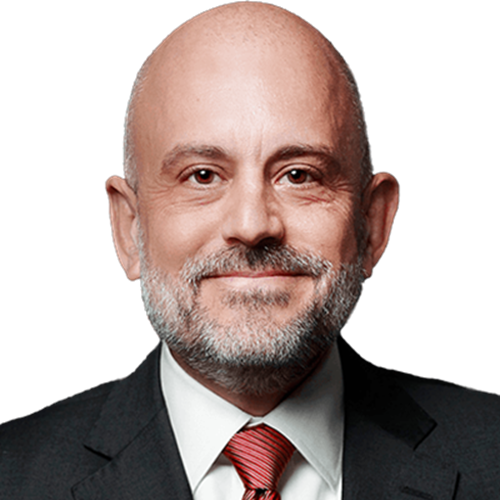Could Bitcoin Replace Gold as the New Safe Haven?
A look back through gold’s history reveals some interesting patterns that could point to what may come next. However, no matter what the future holds, diversification is never a bad idea.

Profit and prosper with the best of Kiplinger's advice on investing, taxes, retirement, personal finance and much more. Delivered daily. Enter your email in the box and click Sign Me Up.
You are now subscribed
Your newsletter sign-up was successful
Want to add more newsletters?

Delivered daily
Kiplinger Today
Profit and prosper with the best of Kiplinger's advice on investing, taxes, retirement, personal finance and much more delivered daily. Smart money moves start here.

Sent five days a week
Kiplinger A Step Ahead
Get practical help to make better financial decisions in your everyday life, from spending to savings on top deals.

Delivered daily
Kiplinger Closing Bell
Get today's biggest financial and investing headlines delivered to your inbox every day the U.S. stock market is open.

Sent twice a week
Kiplinger Adviser Intel
Financial pros across the country share best practices and fresh tactics to preserve and grow your wealth.

Delivered weekly
Kiplinger Tax Tips
Trim your federal and state tax bills with practical tax-planning and tax-cutting strategies.

Sent twice a week
Kiplinger Retirement Tips
Your twice-a-week guide to planning and enjoying a financially secure and richly rewarding retirement

Sent bimonthly.
Kiplinger Adviser Angle
Insights for advisers, wealth managers and other financial professionals.

Sent twice a week
Kiplinger Investing Weekly
Your twice-a-week roundup of promising stocks, funds, companies and industries you should consider, ones you should avoid, and why.

Sent weekly for six weeks
Kiplinger Invest for Retirement
Your step-by-step six-part series on how to invest for retirement, from devising a successful strategy to exactly which investments to choose.
A growing number of people believe Bitcoin could soon replace gold as a safe haven against a depreciating dollar. This, of course, is just speculation, but it is curious to see the exuberance of people regarding Bitcoin.
Aside from the fact that there are a multitude of digital coins (assets), what’s unique about Bitcoin is the fact that its supply is truly fixed. Only 21 million bitcoins will ever be produced. So, considering there are an estimated 47 million millionaires in the world, if each of them wanted just one bitcoin, they couldn’t all acquire one. These supply limitations make Bitcoin bullish.
Gold on the other hand, has been a means of storing wealth for 5,000 years and is a real physical asset. It has always had value in times of geopolitical uncertainty and has many commercial uses. It is inert, making it for the ages, and with mining declining and demand on the rise, we can only assume that prices would increase.
From just $107.88 $24.99 for Kiplinger Personal Finance
Become a smarter, better informed investor. Subscribe from just $107.88 $24.99, plus get up to 4 Special Issues

Sign up for Kiplinger’s Free Newsletters
Profit and prosper with the best of expert advice on investing, taxes, retirement, personal finance and more - straight to your e-mail.
Profit and prosper with the best of expert advice - straight to your e-mail.
Whether you lean digital or physical, at the core of the debate is a universal distrust of government, and rightfully so, in my opinion. We have seen governments spend and print money at levels so outside of the lanes of being responsible that all we can do is observe and wait to see what happens next.
It is maddening as we watch currencies around the world collapse and regimes fail, it only fuels the appetite for finding ways to store wealth outside of governments’ grips. You have to ask yourself, what is the tipping point?
A History of Gold’s Value Comes Full Circle
When it comes to gold, we only need to look at history to know its viability, but aside from the historical price of gold, the historical events that influenced those prices are where our focus needs to be as we see things beginning to come full circle.
Gold has a very long history ,but we will pick up with the signing of the Federal Reserve Act in 1913. At the time, the country was facing a money supply shortage at the local bank level, and the idea of centralizing the banking system seemed the answer for controlling the elasticity of the money supply.
Then in 1934 the government was running short on money. So, to increase the supply at the Federal Reserve, they raised the spot price of gold by 69% to $35 per ounce. (It is important to note here that the dollar was backed by the gold standard at the time and in order to have more money, the price of gold would have to be higher.) It wasn’t the printing we see today, but it shows the government’s ability to manipulate the currency.
I wrote about something similar the Romans did in my book, Common Sense. Caesar Augustus trimmed the edges of the gold coins to harvest the gold in order to create a new set of coins. The result was a smaller coin with less gold but more coins to circulate. Well, we know how that turned out.
Stagnation, Then Inflation
Jumping to 1964, we see the Dow Jones average was around 800, and 16 year later was still hovering around 800. The reasons for the flat line were many: the Vietnam War, a heavy tax burden, rampant inflation and the lingering possibilities of a nuclear war between the Soviet Union and the United States. The convergence of all these things was preventing the economy from improving, and the markets remained stagnant.
In 1971, the government found itself with yet another money supply shortage, and their answer was to rid themselves of the one thing holding them back: the gold standard. So, the government debased our currency from gold and converted it to a fiat currency. This allowed what we refer to today as the ability to print money without anything backing the stated value other than the government’s creditworthiness.
After this conversion to a fiat currency, gold began a steady climb in value as the dollar began depreciating, reaching an average price of $614 in 1980, up from $35 in less than a decade.
Hot Economy Hammers Gold
Then came the Economic Recovery Tax Act of 1981, which began an explosion of wealth that stretched through the 1990s. The act reduced taxes and regulations. Later in the decade came the fall of the communist Soviet Union, which sparked optimism about the future and provided relief from the prospects of a nuclear threat or communist takeover. With a more optimistic view of the economy, as demand shrank, we saw gold prices decline, bottoming out in 2001 at an average price of $271.
Then in the early 2000s we saw a shift back to a loss of confidence when a series of events turned the tides and resurfaced insecurities of the past. The tech bubble burst, the 9/11 terrorist attack, and the mortgage meltdown all occurred within an eight-year period. The government once again turned on the printing presses, and free money began to circulate in an unprecedented fashion and hasn’t really stopped since.
After the worst of 2008, the markets and our economy began clawing their way out of a gaping hole until the Tax Cut and Jobs Act of 2017. From 2017 though 2021 (including COVID in 2020) the markets rose by 56% as a result of the tax cuts and deregulation, allowing businesses to expand and hire more employees.
Back to the Future
Fast forward to today, we see the government aggressively spending money, and if we look at other countries that have traveled the road we are on (not unlike the Romans), we see that it ends badly.
We must also be mindful of the fact that there is a serious rise in global tensions between China and the United States, and Russia and the United States that have an eerie resemblance to the Cold War.
I mentioned earlier that we were coming full circle. What we have learned through this history lesson is that the government’s appetite for spending money is insatiable and has proven to erode our currency to what end? This leaves the future of the markets, our currency and the future of our country uncertain as we venture deeper and deeper into unchartered waters.
With All This in Mind, What about Bitcoin vs. Gold?
Which brings me back to the question, will Bitcoin replace gold as the new safe haven? Lacking a crystal ball, I don't know if this will happen, and neither does anyone else. Quite frankly, I am not even sure if this is the right question to ask, but it is a lingering question and one that cannot be answered without understanding the history of our currency.
With all this uncertainty around us, we are certainty seeing a flight to safety, but if you are a diversified investor, perhaps you should own both gold and Bitcoin instead of debating about which is better. By focusing on things you can control, such as your allocation, you can participate if there are gains and limit your exposure if something goes south. Hence, diversification.
Proponents believe that Bitcoin and its blockchain might very well rewire the entire global financial network based on the fact that bitcoin and blockchain, along with smart contracts and NFTs, are the most revolutionary technological innovations since the internet itself. With that, it is safe to consider that it stands alone as its own asset class separate from gold.
But if one is steadfast in comparing the digital asset to gold, you could say that Bitcoin is the more convenient of the two to own, being that it is accessible via the internet at any time. However, as a physical asset, gold can be held securely in hand free of internet outages or a hacking threat.
I will conclude with this: Gold has always been a storage of wealth, and Bitcoin may very well be that in the future but is too volatile to replace gold at this time. Instead look at Bitcoin as the technology of tomorrow, knowing that tomorrow is closer than you think.
One of the most important things to consider before buying gold, Bitcoin or other investments is knowing your risk tolerance. Many people are unsure about how to articulate their feelings about risk and will often resort to using ambiguous words to describe their tolerance. That doesn’t have to be the case for you. You can have a precise score to describe your risk tolerance for free by taking my risk score quiz here.
Sources:
https://www.hoover.org/research/ten-causes-reagan-boom-1982-1997
https://www.washingtonpost.com/news/wonk/wp/2013/12/21/the-federal-reserve-was-created-100-years-ago-this-is-how-it-happened/
https://www.federalreservehistory.org/essays/jekyll-island-conference
https://www.macrotrends.net/1333/historical-gold-prices-100-year-chart
https://www.macrotrends.net/1358/dow-jones-industrial-average-last-10-years
https://coingeek.com/bitcoin-creator-dr-craig-wright-on-trickle-down-theory/
Securities offered through Kalos Capital Inc., Member FINRA/SIPC/MSRB and investment advisory services offered through Kalos Management Inc., an SEC registered Investment Advisor, both located at 11525 Park Wood Circle, Alpharetta, GA 30005. Kalos Capital Inc. and Kalos Management Inc. do not provide tax or legal advice. Skrobonja Financial Group LLC and Skrobonja Insurance Services LLC are not an affiliate or subsidiary of Kalos Capital Inc. or Kalos Management Inc.
Securities offered only by duly registered individuals through Madison Avenue Securities, LLC. (MAS), Member FINRA & SIPC. Advisory services offered only by duly registered individuals through AE Wealth Management (“AEWM”), a registered investment adviser. Skrobonja Financial Group, LLC, Skrobonja Insurance Services, LLC, AEWM and MAS are not affiliated entities. The article and opinions in this publication are for general information only and are not intended to provide specific advice or recommendations for any individual. We suggest that you consult your accountant, tax or legal adviser with regard to your individual situation.
Profit and prosper with the best of Kiplinger's advice on investing, taxes, retirement, personal finance and much more. Delivered daily. Enter your email in the box and click Sign Me Up.

Brian Skrobonja is a Chartered Financial Consultant (ChFC®) and Certified Private Wealth Advisor (CPWA®), as well as an author, blogger, podcaster and speaker. He is the founder and president of a St. Louis, Mo.-based wealth management firm. His goal is to help his audience discover the root of their beliefs about money and challenge them to think differently to reach their goals. Brian is the author of three books, and his Common Sense podcast was named one of the Top 10 podcasts by Forbes. In 2017, 2019, 2020, 2021 and 2022, Brian was awarded Best Wealth Manager. In 2021, he received Best in Business and the Future 50 in 2018 from St. Louis Small Business.
-
 Quiz: Do You Know How to Avoid the "Medigap Trap?"
Quiz: Do You Know How to Avoid the "Medigap Trap?"Quiz Test your basic knowledge of the "Medigap Trap" in our quick quiz.
-
 5 Top Tax-Efficient Mutual Funds for Smarter Investing
5 Top Tax-Efficient Mutual Funds for Smarter InvestingMutual funds are many things, but "tax-friendly" usually isn't one of them. These are the exceptions.
-
 AI Sparks Existential Crisis for Software Stocks
AI Sparks Existential Crisis for Software StocksThe Kiplinger Letter Fears that SaaS subscription software could be rendered obsolete by artificial intelligence make investors jittery.
-
 Social Security Break-Even Math Is Helpful, But Don't Let It Dictate When You'll File
Social Security Break-Even Math Is Helpful, But Don't Let It Dictate When You'll FileYour Social Security break-even age tells you how long you'd need to live for delaying to pay off, but shouldn't be the sole basis for deciding when to claim.
-
 I'm an Opportunity Zone Pro: This Is How to Deliver Roth-Like Tax-Free Growth (Without Contribution Limits)
I'm an Opportunity Zone Pro: This Is How to Deliver Roth-Like Tax-Free Growth (Without Contribution Limits)Investors who combine Roth IRAs, the gold standard of tax-free savings, with qualified opportunity funds could enjoy decades of tax-free growth.
-
 One of the Most Powerful Wealth-Building Moves a Woman Can Make: A Midcareer Pivot
One of the Most Powerful Wealth-Building Moves a Woman Can Make: A Midcareer PivotIf it feels like you can't sustain what you're doing for the next 20 years, it's time for an honest look at what's draining you and what energizes you.
-
 I'm a Wealth Adviser Obsessed With Mahjong: Here Are 8 Ways It Can Teach Us How to Manage Our Money
I'm a Wealth Adviser Obsessed With Mahjong: Here Are 8 Ways It Can Teach Us How to Manage Our MoneyThis increasingly popular Chinese game can teach us not only how to help manage our money but also how important it is to connect with other people.
-
 Looking for a Financial Book That Won't Put Your Young Adult to Sleep? This One Makes 'Cents'
Looking for a Financial Book That Won't Put Your Young Adult to Sleep? This One Makes 'Cents'"Wealth Your Way" by Cosmo DeStefano offers a highly accessible guide for young adults and their parents on building wealth through simple, consistent habits.
-
 Global Uncertainty Has Investors Running Scared: This Is How Advisers Can Reassure Them
Global Uncertainty Has Investors Running Scared: This Is How Advisers Can Reassure ThemHow can advisers reassure clients nervous about their plans in an increasingly complex and rapidly changing world? This conversational framework provides the key.
-
 I'm a Real Estate Investing Pro: This Is How to Use 1031 Exchanges to Scale Up Your Real Estate Empire
I'm a Real Estate Investing Pro: This Is How to Use 1031 Exchanges to Scale Up Your Real Estate EmpireSmall rental properties can be excellent investments, but you can use 1031 exchanges to transition to commercial real estate for bigger wealth-building.
-
 Should You Jump on the Roth Conversion Bandwagon? A Financial Adviser Weighs In
Should You Jump on the Roth Conversion Bandwagon? A Financial Adviser Weighs InRoth conversions are all the rage, but what works well for one household can cause financial strain for another. This is what you should consider before moving ahead.
